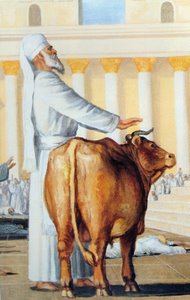The חטאת (chata'at- sin offering) is the fourth of the qorbanot described in Leviticus and is found in chapter 4.
Speak to the sons of Israel, saying, 'If a person sins unintentionally in any of the things which the LORD has commanded not to be done, and commits any of them, if the anointed priest sins so as to bring guilt on the people, then let him offer to the LORD a bull without defect as a sin offering [chata'at] for the sin he has committed. (Leviticus 4:2)
Note that the sin offering is for unintentional sin and is used whether the sin was committed by an individual (priest or non-priest: Leviticus 4:2-3) or by the entire congregation (Leviticus 4:13).
| Chata'at | |||||
| Who Sinned? | What is Offered? |
Without Defect? |
Slain By Whom? |
Slain Where? | Entrails? |
| The priest- (Lev 4:3) |
A bull [par ben bakar]- (Lev 4:3) | Yes- (Lev 4:3) |
The sinner- (Lev 4:4) |
Before the tent of meeting- (west of the altar- Lev 4:4) |
The fat that covers the entrails and is on the entrails, two kidneys, and the liver are burned up as an olah- (Lev 4:8-10) |
| The congregation- (Lev 4:13) |
A bull of the herd- (Lev 4:14) |
No mention | The priest- (Lev 4:15) |
Before the LORD- (west of the altar- Lev 4:15) |
The entire fat tail, the fat that covers the entrails and is on the entrails, two kidneys, and the liver are burned up as an olah- (Lev 4:19-21) |
| A leader [nasi]- (Lev 4:22) |
A male goat- (Lev 4:23) |
Yes- (Lev 4:23) |
The sinner- (Lev 4:24) |
Before the LORD- (west of the altar- Lev 4:24) |
All its fat shall be offered up in smoke on the altar as in the case of the fat of the sacrifice of peace offerings- (Lev 4:26) |
| A commoner [am ha-eretz]- (Lev 4:27) | A female goat- (Lev 4:28) |
Yes- (Lev 4:28) |
The sinner- (Lev 4:29) |
"At the place of the burnt offering"- (west of the altar- Lev 4:29) |
All its fat, just as the fat was removed from the sacrifice of peace offerings shall be offered up in smoke on the altar as an olah for a soothing aroma- (Lev 4:31) |
| A female lamb- (Lev 4:32) |
Yes- (Lev 4:32) |
The sinner- (Lev 4:33) |
"At the place where they slay the burnt offering"- (west of the altar- Lev 4:33) |
All its fat, just as the fat of the lamb is removed from the sacrifice of the peace offerings, is offered up in smoke - (Lev 4:35) |
|
|
Details |
|||||

|
|||||
If the sin is committed by "the whole congregation of Israel" and it "escapes the notice of the assembly" (once more denoting an unintentional sin) then the elders of the congregation place their hands on the head of a single bull on behalf of the entire congregation (Leviticus 4:13-15). The process described above for an individual remains the same.
If the unintentional sin is committed by "a leader" [Heb: נשׂיא (nasi)- "one who is lifted up", a prince] then the offering is a male goat without defect (Leviticus 4:22-23). The leader slays the animal "before the LORD" (verse 24). The process described above for individuals remains the same except that the hide, flesh, head, legs, and other entrails are not mentioned.
The qorban for the priest, the congregation, and a leader must all be male animals whereas the commoner may bring either a female goat or a female sheep (a less expensive offering). This provides us with a picture of G-d's mercy.
Law for Chata'at
The "law for chata'at" is found in Leviticus chapter 6 and includes:
- The chata'at shall be slain in the place where the olah is slain: it is holy. (Lev 6:25)
- The priest who offers the chata'at shall eat it in a holy place in the court of the tent of meeting. (Lev 6:26)
- Anyone who touches the flesh of the chata'at will become consecrated (sanctified) [Heb: qadash]. (Lev 27)
- When any of the blood of the chata'at splashes on a garment then that garment is washed in a holy place. (Lev 6:27)
- An earthenware vessel in which the garment was boiled shall be broken. (Lev 6:28)
- A bronze vessel in which the garment was boiled shall be scoured and rinsed in water. (Lev 6:28)
- Every male among the priests may eat of the chata'at: it is most holy [qadosh qedoshim]. (Lev 6:29)
- The exception to this rule: the priests may not eat the chata'at from which any of the blood is brought into the tent of meeting to make atonement in the holy place. It is to be burned with fire. (Lev 6:30)